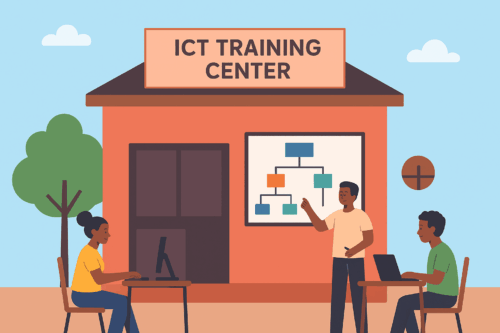Setting Up an Internet Café or ICT Training Center: A Complete Guide

In today’s fast-paced digital economy, access to technology and digital skills has become essential for both education and employment. Across Africa—and especially in Ghana—community-based internet cafés and ICT training centers play a critical role in promoting digital literacy, youth empowerment, and entrepreneurship.
What was once a simple place to browse the internet has now evolved into a digital learning hub, offering training in computer skills, online business, and digital creativity. If you are passionate about technology, education, or youth development, starting an ICT training center or internet café business can be both profitable and impactful.
How to Start an Internet Café Business
Planning and Research
The first step in building an ICT center is understanding your community’s needs. Are you targeting students, entrepreneurs, or job seekers? Identify what services they lack—such as printing, online registration, or computer training—and design your center to fill that gap.
Also decide if your business will focus on browsing and printing services, digital skills training, or a combination of both.
Choosing a Strategic Location
Your location determines your success. Choose a site near schools, markets, or transport stations for easy access. Ensure stable electricity and internet connectivity. Areas with youth populations or educational institutions are especially ideal for ICT centers.
Cost and Equipment Needed
Essential Tools for Setup
To launch an internet café or ICT training center, you will need:
- Computers (desktop or laptop)
- Printers and scanners
- Routers and modems for broadband connectivity
- Comfortable furniture (desks and chairs)
- Uninterruptible Power Supply (UPS) or generator
- Licensed software (Microsoft Office, antivirus programs, etc.)
Setup Costs and Budgeting
Your initial investment depends on the scale of your operation.
- Small-scale setup: 5–10 computers with basic browsing and printing services.
- Medium setup: 15–25 computers with an added ICT training section.
- Large setup: Over 30 computers offering specialized courses like coding, graphics, or data analytics.
Profitable Services to Offer
Your café or ICT center should offer diverse services to ensure multiple income streams. Examples include:
- Internet browsing and printing
- Online registration and photocopying
- ICT and digital literacy training
- Typing and design services using tools like Canva and Photoshop
- Online learning support for students
- Mobile money or online payment assistance
Attracting Students and Professionals
Building Trust Through Value
Offer free or discounted introductory classes on basic computer skills to draw in potential clients. Partner with schools, youth groups, and local organizations to reach learners who can benefit from your programs.
Marketing Tactics for ICT Centers
Use social media marketing to promote your services. Platforms like Facebook, WhatsApp, and Instagram can help spread awareness of your center’s programs. Encourage word-of-mouth referrals by rewarding loyal customers or students who bring new clients.
Training Programs to Offer
A strong training curriculum keeps your ICT center relevant and competitive.
Recommended programs include:
- Basic Computer Literacy and Microsoft Office Suite
- Email and Internet Navigation
- Graphic Design (Canva, CorelDRAW, Photoshop)
- Coding for Beginners (Python, Scratch, HTML)
- Online Business Skills (Social media marketing, e-commerce)
Marketing Strategies for ICT Centers
To grow your business, you need visibility and credibility.
- Create a professional brand identity with a logo, signage, and social media presence.
- Share success stories of your students online.
- Offer certificates of completion to boost your center’s reputation.
- Use Google Business Profile so people can easily find your center online.
Managing Challenges in ICT Businesses
Running an ICT training center comes with challenges like high electricity bills, equipment maintenance, and unreliable internet.
Solutions
- Explore solar power or energy-efficient devices.
- Partner with telecom companies for stable internet packages.
- Seek support from NGOs or digital programs that fund youth-oriented ICT projects.
Education Meets Entrepreneurship
An ICT training center doesn’t just teach—it empowers. Many centers combine business and education to create lasting social impact.
By training young people in digital literacy, you’re not only creating a business but also reducing unemployment and helping others start their own tech-driven ventures.
Support from Government and NGOs
Several organizations provide funding and training support for ICT centers.
These include:
- GIZ Digital Transformation Center
- UNESCO and the Ministry of Education
- Local government initiatives supporting community tech hubs
Registering your center with local authorities also increases your chances of receiving grants, equipment, and official recognition.
Future Trends in ICT Education
The next generation of internet cafés and ICT centers will focus on online and hybrid training, integrating AI, robotics, and virtual learning into their curricula.
As technology evolves, community-based ICT hubs will continue to bridge the gap between education, innovation, and entrepreneurship.
Scaling Your Internet Café or ICT Training Center
Once your ICT center is running successfully, you can scale up operations to reach a wider audience and increase profitability. Scaling is not just about adding more computers—it’s about expanding your impact, visibility, and service offerings.
1. Diversify Your Services
Introduce new services such as:
- Online classes and webinars for remote learners.
- Corporate training programs for professionals and businesses.
- Freelancing and digital entrepreneurship workshops to empower youth.
- Certification courses in collaboration with accredited institutions.
These additions help transform your ICT center into a recognized digital hub within your community.
2. Expand to New Locations
If your first center is successful, consider opening branches in nearby towns or educational districts. Target underserved areas where digital learning opportunities are limited.
3. Build Partnerships
Partner with schools, NGOs, and local authorities to host training sessions and outreach programs. Partnerships not only expand your reach but also enhance your credibility as a trusted digital literacy provider.
4. Offer Internship and Mentorship Programs
Allow your best-performing students to become interns or teaching assistants. This reduces staff costs and creates a learning-to-earning pathway that keeps your center relevant and sustainable.
You can also read on: https://baobabentrepreneur.com/social-media-management-and-digital-marketing/
Real-Life Impact: Transforming Communities Through ICT
ICT centers are transforming communities across Ghana and Africa. For example:
- A youth in Kumasi who started a small printing shop later expanded into offering graphic design and coding classes, training dozens of students each year.
- A teacher in Takoradi set up a mini ICT hub that helps school leavers learn digital marketing and Microsoft Office, empowering them to get jobs or freelance.
These examples show that small ICT businesses can create long-term employment, boost digital inclusion, and contribute to local economic growth.
Combining Education and Entrepreneurship
Starting an ICT center is more than a business—it’s an educational mission.
It allows you to blend social impact with profit, creating a sustainable enterprise that uplifts your community.
By offering digital literacy, coding, and online business training, you’re equipping the next generation with the skills needed to thrive in the digital economy.
As more Ghanaians and Africans gain access to technology, ICT centers will become the cornerstones of innovation, self-employment, and lifelong learning.
The Future of ICT Centers in Africa
The ICT landscape in Africa is rapidly evolving. As technology becomes more affordable and internet connectivity improves, there’s a rising demand for localized tech education.
Future ICT centers are expected to integrate:
- Artificial Intelligence (AI) for adaptive learning
- Virtual Reality (VR) for immersive training
- E-learning platforms for remote learners
- Mobile-friendly digital tools for on-the-go education
This shift means that tomorrow’s ICT centers will not just be physical spaces—they’ll be hybrid tech hubs connecting learners both locally and globally.
Final Tips for Entrepreneurs Starting an ICT Center
To succeed in the ICT and digital training industry, consider these final tips:
- Start small, but think big. Begin with a few computers and expand as demand grows.
- Focus on quality service. Good customer experience builds long-term loyalty.
- Keep learning. Technology evolves fast—stay updated with new tools and trends.
- Build a team. Hire or train assistants who share your vision for digital empowerment.
- Leverage social media. Use Facebook, LinkedIn, and WhatsApp to market your center.
Building Financial Sustainability for Your ICT Center
To ensure your Internet Café or ICT Training Center remains successful in the long term, financial planning is crucial. Many centers close down not because of lack of demand, but due to poor financial management and planning.
1. Develop Multiple Revenue Streams
Relying on one service, such as internet browsing, is risky. Instead, diversify by offering:
- Digital printing, photocopying, and scanning services
- Online registration and application services (for exams, scholarships, jobs, etc.)
- Typing and document preparation
- Short courses and workshops on software skills and entrepreneurship
- Website design, CV design, and social media setup for businesses
These additional income streams help maintain your cash flow even during low-demand seasons.
2. Introduce Membership and Subscription Models
Offer discounted rates for students or loyal customers through monthly or termly memberships.
For ICT training programs, consider tiered pricing, such as:
- Beginner (Basic computer skills)
- Intermediate (Microsoft Office, graphic design, or digital marketing)
- Advanced (Programming, data analytics, or web development)
This structured pricing allows customers to choose what fits their goals and budget.
3. Monitor and Reduce Operational Costs
Track expenses such as electricity, internet data, and maintenance.
- Use energy-efficient computers and routers.
- Negotiate bulk internet packages with providers.
- Schedule regular maintenance to avoid costly repairs.
Running your ICT center efficiently can increase your profit margin and improve long-term sustainability.
Partnering with the Community and Stakeholders
Community partnerships are one of the most effective ways to grow your ICT training center. Collaboration helps you reach more learners, attract funding, and gain credibility.
1. Collaborate with Local Schools and Universities
Partner with schools to offer after-school computer lessons or holiday tech camps.
This provides students with digital skills while introducing parents to your services.
2. Work with NGOs and Development Agencies
Organizations like GIZ, UNESCO, UNICEF, and local NGOs often run digital inclusion programs.
Partnering with them can provide funding, training materials, and technical support.
3. Engage Local Businesses and Government Offices
Offer digital transformation training for small business owners and civil servants.
This helps improve local productivity while positioning your center as a trusted digital resource hub.
Evolving Digital Skills for the Future
The digital economy is changing rapidly, and your ICT center should evolve with it.
Today’s learners need more than just typing and browsing—they need career-ready digital skills.
Emerging Skill Areas to Include:
- Digital marketing and content creation
- Coding and software development
- UI/UX design and mobile app development
- Cybersecurity fundamentals
- Freelancing and online business management
Offering such programs will make your ICT center a future-proof hub that continuously attracts learners and entrepreneurs.
The Long-Term Impact of ICT Centers on Society
ICT centers go beyond providing services—they transform communities.
When people gain access to digital skills, they also gain access to opportunities.
1. Empowering Youth and Reducing Unemployment
By training young people in digital literacy, you help them become employable or self-employed.
Some may start their own businesses, while others find remote work opportunities online.
2. Promoting Digital Inclusion
Rural and underserved communities benefit most from ICT centers.
They provide access to technology and education where traditional institutions may be lacking.
3. Supporting National Development
Digital literacy directly contributes to a country’s economic growth and innovation capacity.
When communities become tech-savvy, they attract investment and improve overall productivity.
Case Study: A Community ICT Center Success Story
In 2022, a small ICT center in Sunyani, Ghana, started with just five computers. Within two years, it expanded to include graphic design training, digital marketing classes, and a small printing shop.
The founder collaborated with a local NGO to train 100 young women in digital entrepreneurship. Many graduates now run their own online businesses.
This example shows that even a small digital hub can have a massive impact when combined with passion, planning, and community engagement.
Turning Vision into Impact
Starting an Internet Café or ICT Training Center is more than just a business—it’s a movement for change.
You’re not only offering access to the internet; you’re providing access to knowledge, empowerment, and opportunity.
By focusing on education, innovation, and sustainability, you can build a center that benefits both your finances and your community.
Whether you start in a small room with a few computers or in a larger space with full training facilities, the key is consistency and community engagement.
In today’s digital-first world, your ICT center can become the gateway to the future—helping individuals, schools, and entrepreneurs succeed in the ever-evolving digital economy.
Conclusion
Setting up an Internet Café or ICT Training Center is one of the most impactful ventures an entrepreneur can start in Ghana or anywhere in Africa.
It combines technology, education, and entrepreneurship—three forces driving Africa’s development. Beyond earning profits, you’ll be creating opportunities for others to learn, grow, and build a better future.
In a world where digital literacy defines success, your ICT center could be the bridge between potential and progress for hundreds of young people.
So, start today—invest in technology, build your dream, and become part of Africa’s digital transformation story.















